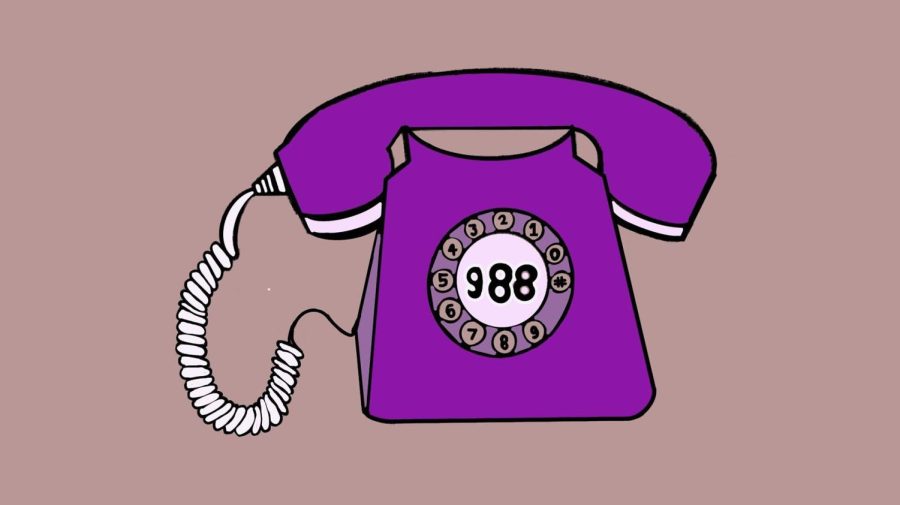Mendenhall: It’s About Time for the 988 Hotline
(Design by Brenda Payan Medina | The Daily Utah Chronicle)
August 9, 2022
As of July 16, the National Suicide Prevention Lifeline can be reached by dialing 988, routing callers to trained counselors and mental health specialists. Individuals can also text and access a chat feature, increasing user accessibility throughout the nation.
The introduction of this new format of the hotline will prove incredibly useful, as mental health and suicide rates have risen over the last few years. The hotline could help guide callers in finding the right resources, in addition to aiding first responders in staying organized with handling crises, making it a great mental health resource.
Managing the Hotline
The 988 Suicide and Crisis Lifeline connects hundreds of local and state crisis centers to provide the best intervention services possible. In Utah, our local crisis center is the Huntsman Mental Health Institute, formerly known as UNI. Once directed to the institute, those experiencing crisis have many resources available to them. Some of these include therapeutic assistance and coordination with first responders.
A study conducted by RAND showed that “early, timely and appropriate care are significant shortcomings of the U.S. mental health system, and certain populations (e.g., individuals in rural areas, individuals from marginalized groups) may experience disparities in access to care.” Healthcare disparities are unfortunately common, and those with mental health conditions are part of a disadvantaged demographic. Minority groups also often experience sudden mental health crises due to lack of quality mental healthcare and the stigma surrounding it.
Although the hotline is a great resource, there are reasons it’s taken so long to prepare and implement. One is that we don’t want to overwhelm local crisis centers and responders with the increase in outreach. The Huntsman Mental Health Institute is opening a Crisis Care Center in 2024, anticipating that the need for their services will only continue to grow. Despite it taking so long to implement, this will provide people with the care they need, destigmatizing mental health further.
Comparison to SafeUT
Utah’s own SafeUT program is similar to the 988 hotline. SafeUT provides help and resources to those suffering from mental health crises, connecting these individuals with licensed professionals. SafeUT also utilizes a chat feature, much like the 988 hotline. However, one thing the national hotlines lack in comparison to SafeUT is an anonymous tip line. The anonymous tip line feature maintains confidentiality in its user-interface, and the new national hotline should consider implementing a similar feature.
The SafeUT app has helped numerous individuals amid safety threats, particularly in school settings. If the SafeUT app receives a few tips about the same incident or potential hazard, schools take instant action. This has prompted quicker response times to potential threats, improving safety for many.
Comparison to Campus Resources
In addition to these hotlines, U students have access to the university’s Counseling Center (UCC). Several crisis resources are found on their website. These resources consist of the national hotline, U Hospital access and UCC crisis service. However, some of the resources that the counseling center offers prove hard to use in times of immediate crisis.
I contacted the counseling center while experiencing an immediate mental health crisis during my freshman year (2020). I contacted the UCC during the hours that they state they’re available for crisis help. The counseling center did not get back to me, so I instead turned to other resources I found on their website. I received the help I needed from the Huntsman crisis hotline, which is where the national hotline would have directed me as well.
U student Clara Dehlin is one of many students that have taken advantage of the non-emergency services that the UCC offers. In 2019, Clara contacted the Counseling Center and attended sessions for several months.
“When I was needing therapy my freshman year, I was not in a crisis state of mind at all,” Dehlin said. “And I … could totally see that they would have not been able to provide the care that I would have needed.”
Although the UCC helped her, she simultaneously acknowledged that these resources wouldn’t be enough for students in situations requiring immediate intervention.
While Dehlin and my own experiences are different, we’ve both walked away with the impression that without the help of the Huntsman crisis hotline, the UCC could not have effectively or efficiently addressed a mental health crisis. Individuals experiencing time-sensitive mental health crises need help immediately. The UCC and their crisis service number can’t always be relied on if students must tolerate long response times. Mental health crises don’t just happen during business hours. Luckily, we have the 988 hotline that routes to the Huntsman local crisis center in case campus resources aren’t meeting expectations.
The 988 hotline will be an invaluable tool for many people on both state and national levels. While local programs and resources here in Utah are a fantastic start, I hope to see more progress with the hotline in the future. Mental health is slowly becoming destigmatized, but we still have a long way to go before our crisis resources match the dialogue that we’ve created.










Nelson LeDuc • Aug 22, 2022 at 1:47 pm
This is indeed great news!
I kinda wish there was a national I’m-not-suicidal-but-I-could-really-use-someone-to-talk-to hotline. 987, maybe?